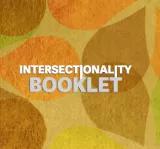Intersectionality Booklet
We present to you this booklet at a time when the world is constantly changing and evolving to resist forms of subjugation and dependency, against policies that have impoverished, marginalized, and subjected peoples and individuals to all forms of violence and still continue to exert their domination.
Such resistance movements persist and convey their messages from one generation to another despite the suppression and systemic silencing. Since the 1960s, the world has witnessed the emergence of wide-ranging social, political, and economic movements demanding an end to wars and colonization, the realization of justice, and progress towards freedom. As part of these resistance movements, we have existed and intersected with each other in different places and times, carrying our burdens, being present in various arenas, and responding to the same issues from different perspectives and priorities; We have long been intersectional in practice, without even defining it as such!
The same universal demands were and continue to be central to the Tunisian social, economic and political scene. Since May 1968, all anti-colonial, labor rights and student movements have consistently called for freedom and social justice. Over a decade after the outbreak of the Tunisian Revolution on December 17, 2010 / January 14, 2011, the same intersectional slogans and demands are still raised in public squares. The protests and marches of 2021 across Tunisia are clear proof of this. If we seek to understand these protests from an intersectional perspective, we will find that the participating groups are diverse: women and men from impoverished neighborhoods, those affected by unjust economic policies, feminist activists opposing the patriarchal police state and crimes against women, LGBTQI+ individuals advocating for personal freedoms and striving to assert their right to public presence. All of these groups, experiencing various forms of multi-dimensional oppression, gathered in the arenas of struggle and echoed the same slogans in unison.
Product details
Table of contents
INDEX
INTRODUCTION
I. Literature Review
1. The Emergence of the Concept of Intersectionality
2. The Evolution of Intersectionality within Black Feminism
3. From Black Feminism to Other Feminisms:
Postcolonial Feminism as an Example
4. Roots of Intersectional Research and Activism in Countries
of the Global South
5. From Black Feminism to Other Knowledge Fields and
Frameworks: Intersectional Environmentalism as an Example
II. Intersectionality in the Tunisian Context
1. Intersectionality in Knowledge Fields and Activism in Tunisia:
The Reception of the Term ‘Intersectionality’ in the Tunisian Context
2. The Position of Intersectionality in Tunisian Knowledge
Productions
III. Intersectionality in Field Research
1. Full Adoption of Intersectionality as a Term, Methodology, and
Practice
2. Partial Adoption of Intersectionality as a Methodology and
Practice
3. Practical Adoption of Intersectionality as a Practice
3.1. Practices within the Framework of Associations and Groups
3.2. Cross-organizational Practices: The Congress of Social and
Citizen Movements as an Example
IV. Categories of Intersectionality in the Tunisian
Context
V. Training Guide for Intersectionality
CONCLUSION
